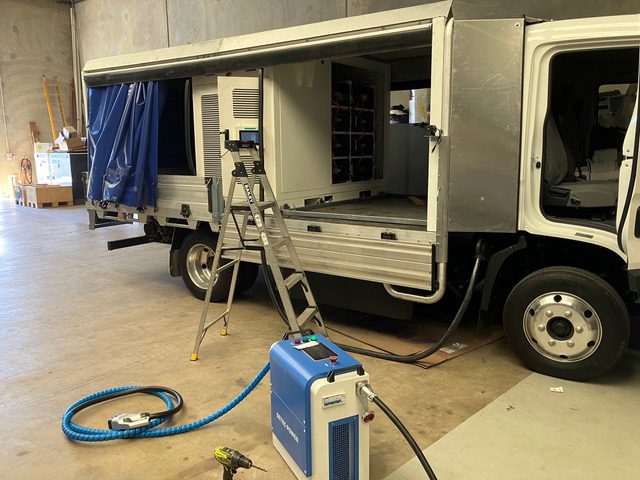I first reported in The Pushed final September on Jon Edwards’ plans to do the primary “huge lap” in an electrical truck, beginning in Perth. See: The electrical truck conversion operating on waste vegetable oil and previous Tesla components
Since then, Jon has bought Australia’s first Hyundai Mighty electrical truck and has additionally considerably modified the conversion of his different truck, a Mitsubishi Fuso, now renamed the “Fusla” in homage to its repurposed Tesla battery and motor.
Though each automobiles have required progressive options to some advanced technical points, the Hyundai is more likely to be most prepared for the journey.
Thankfully, Horizon Energy strongly beneficial delaying the journey till their charger community within the north of WA was accomplished in June.
The latest flooding (and fires) throughout northern WA, NT, Queensland and even the Nullarbor would have made an earlier journey close to to unimaginable.
Jon and his workforce have used this time to switch the Hyundai truck with aerodynamic fairings and an enclosed tray, and to mount a 120kWh transportable battery on the tray.
Positioning the battery for optimum weight distribution has created areas all sides of the battery – the manager and premier sleeping suites. There isn’t a ensuite.
The transportable Biofil fish ‘n chips charger isn’t any extra, partly due to an surprising social media backlash about burning any form of gasoline to energy an EV, and partly due to a view that transporting a liquid gasoline plus charger can be extra of a “hybrid” reasonably than a “pure EV” journey.
The truck requires a minimal of 670V to cost however plenty of older Tritium chargers throughout NT and Queensland solely present 500V.
Jon’s resolution has been to suit charging modules to the tray mounted battery, elevating its output voltage rom 430 to 750V, permitting the truck battery to be charged at 42kW through a CCS2 cable.

The tray battery might be charged at 40kW through a CCS2 port, or at 20kW from a 32A 3 part plug utilizing the blue Setec DC rectifier within the photograph.
The truck battery can cost at as much as 100kW DC however solely 7kW AC, an extended night time in a caravan park.
Jon plans to journey at round 85kph and estimates that at that velocity the truck’s 115kWh battery plus the 120kWh tray battery will give a variety round 400km.
The fairing seems to have dropped consumption by 12-15%, all the way down to 37kWh/100km, not dangerous for a automobile over 5 tonnes loaded.
The truck enters “Turtle mode” at 20% cost, limiting velocity to 69kph. At 12% it drops to 10kph…..
Oddly, the automobile has no lively battery cooling system. Jon has measured temperatures of 52 levels Celsius throughout charging and is worried in regards to the impact of excessive ambient temperatures as a result of the battery enters “safety mode” at 55 levels.
Likewise, the motor has reached 100 levels and likewise enters safety mode at 150. Temperature data can solely be obtained intermittently deep within the display screen menu, inappropriate when driving.
Accessing technical help has been tough, with sluggish and incomplete responses, suggesting help is presently primarily based abroad. Hyundai have been unable to supply data on the best way to monitor these temperatures constantly.
Hopefully Hyundai shall be within the information collected on the journey and can use it to additional refine the automobile.
As at all times, Horizon Energy have been collaborative and supportive of this undertaking and plan to make use of this automobile and the journey for promotions.
The Hyundai is the workhorse, however my coronary heart is with the Fusla which is now a bundle of ingenious innovation and likewise freed from the dreaded canola.
I’ll cowl the Fusla in my subsequent article, however it is going to be on show at AEVA’s workshop occasion on April 20, 11-4pm at Canning River Eco Schooling Centre, Cannington WA (see AEVA web site for registration data).